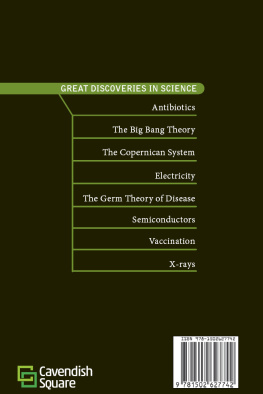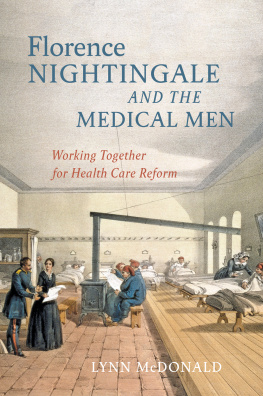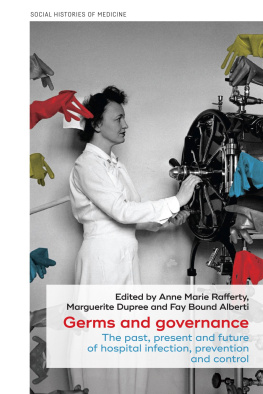
SHERWIN B. NULAND
The Doctors Plague
Germs, Childbed Fever, and the Strange
Story of Ignc Semmelweis

For Ferenc Gyorgyey
Our great friendship began with Semmelweis
There is a word of fear that I shall pronounce when I utter the name of Puerperal Fever; for there is almost no acute disease that is more terrible than this.... There is something so touching in the death of a woman who has recently given birth to her child; something so mournful in the disappointment of cherished hopes; something so pitiful in the deserted condition of the new-born helpless creature, for ever deprived of those tender cares and caresses that are necessary for itthat the hardest heart is sensible to the catastrophe. It is a sort of desecration.
Charles Delucena Meigs, Professor of Midwifery
and the Diseases of Women and Children, Jefferson
Medical College, 1851
Contents
S he felt lucky in at least this one thingit was a Sunday, and she would not have to go to the hospital alone. The Allgemeine Krankenhaus, that great forbidding place of multiple and enclosed buildings, walkways, and inner courtyards, had for months been the stuff of her worst fears. But now that the time had come to surrender herself to it, the girl felt strangely relieved, with the sense that perhaps fortune was again beginning to smile on her just a little. Sunday meant that her friend Liesl was at home, freed for a day from the large, airless loft where the head seamstress, Frau Eigenbrodt, supervised some twenty girls at one of the most fashionable dressmaking houses in mid-nineteenth-century Vienna. Liesl would accompany her as far as the hospitals Eighth Courtyard, help her up the few outer steps, and knock on the large wooden door to the lying-in unit. With such a good friend to take her that far, the fear would be lessened. She would part from Liesl when the nurses appeared, and not lose courage to face the birth of her child.
The girl had stood in the courtyard alone and unobserved many times in these past weeks, watching other young women make their difficult way up the stone outer steps in the final days of their pregnancies. She had even smiled now and then in the midst of her unhappiness, upon witnessing the kindness on the faces greeting these girls and women heavy with the bulk of an infant soon to be born. She knew that the nurses would treat her kindly too, once she crossed the threshold and committed herself to their care.
Kindness was what the girl needed at that long-awaited, long-dreaded hour. Kindness had been all but a stranger to her life since she left her fathers house, five months before. The happiness of being the adored only child of a prosperous, warmhearted tradesman had in an instant evaporated, when she dared to reveal that she was with child. She had somehow expected something else from him, something more of understanding and comfort. Everything that had passed between father and daughter in her eighteen years led her to anticipate a different kind of response, even a soothing of her anguished guilt. Papa would know what to say, she had thought. He would know how to speak to her in the gentle tones that so many times in the past had brought consolation in hours of sadness and even grief, as when her beloved mother died of a lung infection when the girl was only twelve. And he would also know what should be done to make things better. Perhaps, she had hoped, he would find some means of making this thing go away, making it disappear as though it had never been. But there had instead been that outburst of unanticipated rage. There was no mother to calm the storm of abuse and insistent questioning hurled at her by the infuriated widoweronly the servant girl Maria, as uncomprehending and stunned by the force of the tirade as she was herself.
Everything was made worse when she refused to give the fathers name. What good would it have done? He was a student of philosophy at the University of Vienna, and she had met him in a coffeehouse one afternoon quite by accident, after one of her singing lessons. It was thrilling in those first weeks, to go off with such a shining and silver-tongued youth into the meadows outside the city. They would speak of poetry and the romance-scented trivia that pass so effortlessly between young people when they are first finding a way into each others hearts. And then early one evening when her Papa thought she was at a friends house, she gave herself to the ardent boy, right there in the fields under a setting sun. They had been speaking of Goethe, and the young philosopher was comparing his lovesickness to Werthers.
She at first had no regrets for her impulsive behavior, only a sense of wonder and a flowering joy whose petals were opening toward even better days to come. But the boy was inexplicably hesitant to go with her to the pretty little house on the Gartenstrasse to meet Papa. And then, in too short a time, everything began to change between them. Within only a few weeks, he seemed to have undergone a transformation. To make love was all he now wanted to do, and he found rooming houses and the garrets of friends where they met furtively and only long enough to rut, because rutting is what it soon became. She did not know how to stop herself or him, and before long her burgeoning love for the student had become shame. When she told him she was pregnant, he turned from her in disgust, saying it was his own fault for dallying with such a stupid girldallying was the word he used, and with that word told her what she had begun to suspect.
And so she went to her father, truly believing that he would put his protecting arms around her as he had always done since she was a honey-haired little girl, and reassure her that all would be well. But she was stupefied by his outrage, and even now, as she sat uncomfortably on the side of her narrow cot in Liesls tiny room, feeling the earliest of her waves of pain, she could not bring herself to believe that her beloved Papa had actually ordered her out of his house, bellowing his rage in a torrent of abuse. And she could not believe that he had refused to acknowledge the tear-stained letters she had written him in the following weeks, begging to be allowed to come home, begging for solace. Now her baby would have to be born in secret, in the anonymity and bustle of a large public hospital where no one knew her, and she knew no one.
But the girl cherished one glimmering iota of hopemaybe, just maybe, she would go to Papa after the babe was born and he would forgive her everything, once he had laid eyes on his grandchild and loved it even as he would love it if she were properly married.
Liesl was the daughter of the housekeeper who had been with the family until a year after Mama died. The two girls had been friends since earliest childhood and remained close even after Liesls mother left to work in one of the new factories then being built in Vienna. And it was in Liesls little chamber under the eaves of a rooming house for working girls that she had been living since that awful day when her life changed.
Deep in thought, she sat on the edge of her bed for about fifteen minutes; its sheets were soaked with her waters. When the next pain began, she leaned over to touch her sleeping friends arm. Without a word, Liesl got up, wrapped her thin blanket around the girls shoulders and then dressed herself in a threadbare robe draped over her nightdress.Wordlessly, the two young women made their way down the four long flights of battered wooden stairs and out into the dawning days light. Liesl turned to the girl as they stood for a moment in front of the house, gave her a wide smile of encouragement, and took her elbow, in preparation for the long walk of more than half a mile to the Allgemeine Krankenhaus, the General Hospital of Vienna.
Next page









